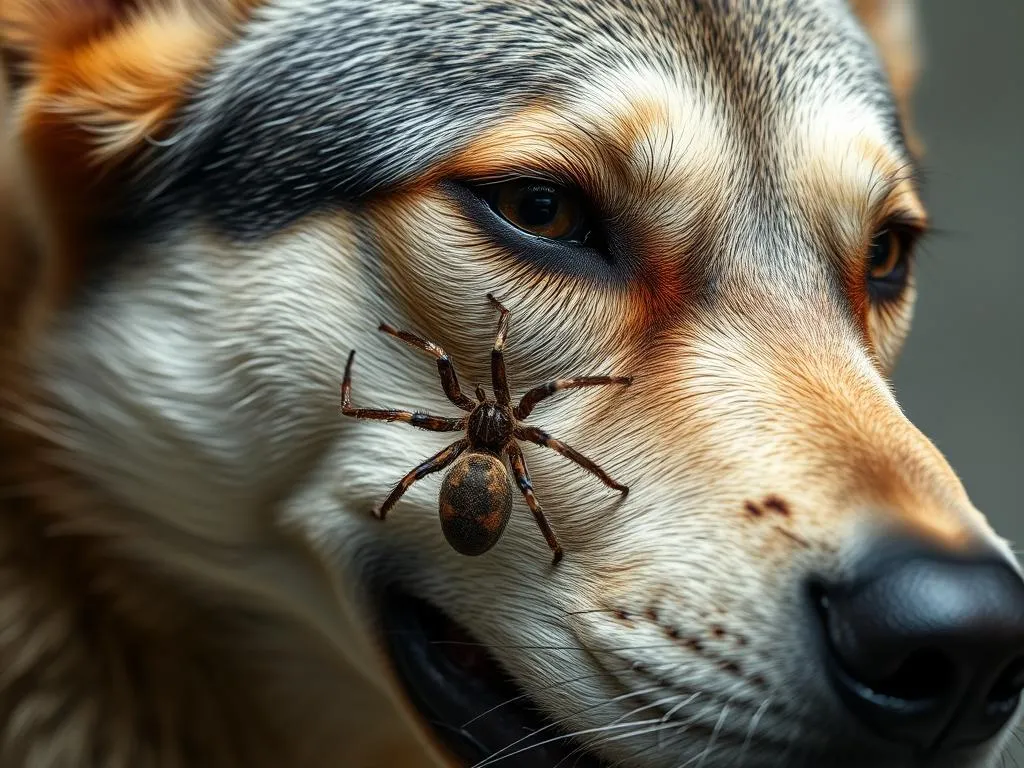
Introduction
Wolf spider bites can be a common concern for dog owners, especially during warmer months when these arachnids are more active. Understanding what a wolf spider is, the signs of its bite, and how to care for your dog can help alleviate worries and ensure your furry friend remains healthy.
Understanding Wolf Spiders
What Are Wolf Spiders?
Wolf spiders belong to the Lycosidae family and are characterized by their robust bodies and long legs. They are usually brown or gray in color, which helps them blend into their surroundings. Adult wolf spiders can vary in size, typically ranging from 0.75 to 2 inches in length. Unlike many spiders, wolf spiders do not spin webs; instead, they are ground hunters, adept at stalking and pouncing on their prey.
These spiders are commonly found in gardens, leaf litter, and under rocks or logs. Their presence in your yard might be unsettling, but these spiders are generally not aggressive toward humans or pets unless threatened.
Wolf Spider Behavior
Wolf spiders are solitary hunters, known for their agility and speed. They primarily feed on insects and other small invertebrates, making them beneficial for controlling pest populations. However, their hunting behavior may lead them to interact with pets, especially if a dog disturbs their hiding spots.
Dogs, being curious by nature, may provoke a wolf spider, resulting in a bite. This behavior is crucial for dog owners to understand as it can help prevent unwanted encounters.
Recognizing a Wolf Spider Bite
Signs and Symptoms
When a dog is bitten by a wolf spider, the symptoms can vary based on the individual dog’s reaction and the bite’s severity. Here are some common symptoms to watch for:
- Swelling: The area around the bite may swell significantly.
- Redness: The skin may appear red or inflamed.
- Pain: Your dog may show signs of discomfort, such as whining or avoiding using the affected limb.
- Lethargy: A bitten dog may become unusually tired or withdrawn.
- Loss of Appetite: Affected dogs may refuse to eat or drink.
Differentiating from Other Bites
It can be challenging to differentiate a wolf spider bite from bites inflicted by other spiders or insects. However, wolf spider bites tend to cause localized swelling and redness without systemic reactions, such as those seen in more venomous spider bites. Understanding these distinctions is essential for ensuring your dog receives appropriate treatment.
Immediate Steps to Take After a Bite
Initial Care for Your Dog
If you suspect your dog has been bitten by a wolf spider, here are some first aid tips:
- Stay Calm: Keeping calm will help your dog remain calm too, reducing their stress.
- Clean the Area: Gently wash the bite area with mild soap and water to prevent infection.
- Apply a Cold Compress: Use a cloth with cold water or ice wrapped in a towel to reduce swelling.
- Monitor Symptoms: Keep an eye on your dog for any changes in behavior or worsening symptoms.
When to Contact a Veterinarian
While many wolf spider bites can be managed at home, certain signs indicate a need for immediate veterinary attention:
- Severe Swelling: If the swelling spreads or becomes severe.
- Difficulty Breathing: Signs of respiratory distress should be treated as an emergency.
- Severe Pain: If your dog seems to be in significant pain, it’s time to seek help.
- Persistent Vomiting or Diarrhea: These symptoms could indicate a more serious reaction.
Timely intervention is crucial in preventing complications from the bite.
Veterinary Diagnosis and Treatment Options
What to Expect During a Vet Visit
When you bring your dog to the vet for a suspected wolf spider bite, expect a thorough examination. The vet will likely ask about:
- The circumstances of the bite (where it occurred, any visible spiders).
- The symptoms you’ve observed.
- Your dog’s medical history, including any allergies or previous reactions to bites.
Treatment Methods
Treatment for a wolf spider bite will depend on the severity of the symptoms:
- Pain Management: Your vet may prescribe medications to alleviate pain.
- Anti-Inflammatory Medications: These are commonly used to reduce swelling and discomfort.
- Antibiotics: If there are signs of infection, antibiotics may be necessary.
In most cases, treatment is straightforward, and dogs recover well with appropriate care.
Follow-Up Care
After treatment, follow-up care is crucial for ensuring a full recovery. Your vet may provide you with specific home care instructions, such as:
- Keeping the bite area clean and dry.
- Monitoring for any signs of infection, such as increased redness or discharge.
- Avoiding strenuous activities for a few days to allow healing.
Prevention Strategies
Reducing Exposure to Wolf Spiders
Preventing wolf spider bites involves making your home and yard less hospitable to these arachnids. Here are some effective strategies:
- Regular Cleaning: Keep your home free of clutter where spiders can hide.
- Yard Maintenance: Trim grass and bushes regularly to reduce hiding spots.
- Seal Cracks: Close off entry points around windows and doors to prevent spiders from entering your home.
- Safe Pest Control: Consider using natural pest control methods or consult a professional for safe options.
Educating Yourself and Family
Teaching your family about spider safety is essential. Encourage everyone to:
- Stay calm and avoid swatting at spiders, as this can provoke them.
- Recognize the difference between harmless and potentially dangerous spiders.
- Know how to respond if they encounter a spider, such as alerting an adult or moving away calmly.
Frequently Asked Questions (FAQs)
Can wolf spider bites be fatal to dogs?
Wolf spider bites are rarely fatal to dogs. Most bites result in mild to moderate symptoms that can be managed effectively with proper care. However, severe allergic reactions or secondary infections can complicate the situation, necessitating prompt veterinary attention.
How long does it take for a dog to recover from a wolf spider bite?
Recovery time can vary depending on the severity of the bite and the dog’s overall health. Most dogs will show improvement within a few days to a week with appropriate treatment.
Are certain dog breeds more susceptible to spider bites?
While there is no specific breed that is more susceptible to spider bites, some smaller breeds may be more at risk due to their size and the potential for more significant reactions to bites.
Can wolf spider bites cause long-term health issues?
Typically, wolf spider bites do not cause long-term health issues. However, complications can arise if the bite becomes infected or if the dog has an allergic reaction. Regular veterinary check-ups can help monitor your pet’s overall health after a bite.
Conclusion
Understanding wolf spider bites and their implications for your dog is crucial for any pet owner. By recognizing the signs and symptoms and knowing when to seek veterinary care, you can ensure the safety and health of your furry friend. Always consult your veterinarian with any concerns, as they are your best resource for maintaining your pet’s well-being. Keeping informed and prepared can help mitigate the risks associated with wildlife encounters, including those with wolf spiders.









